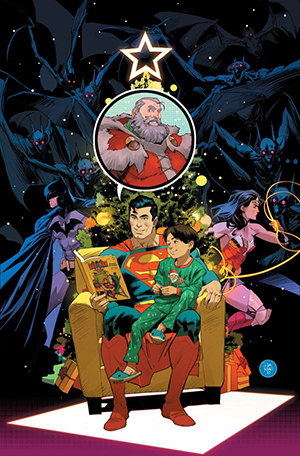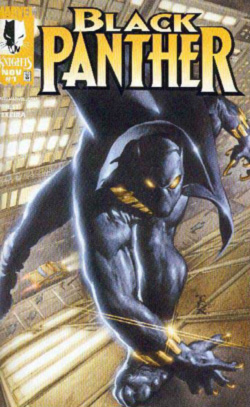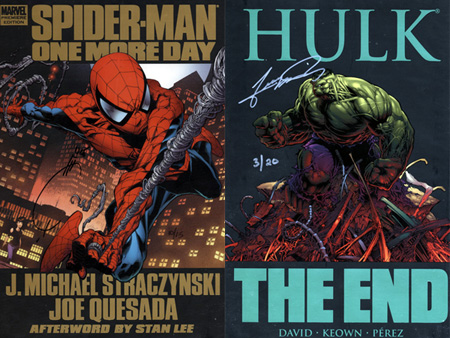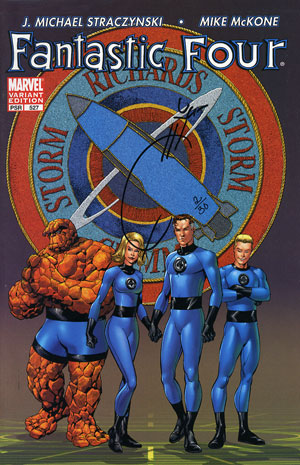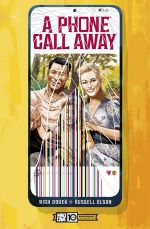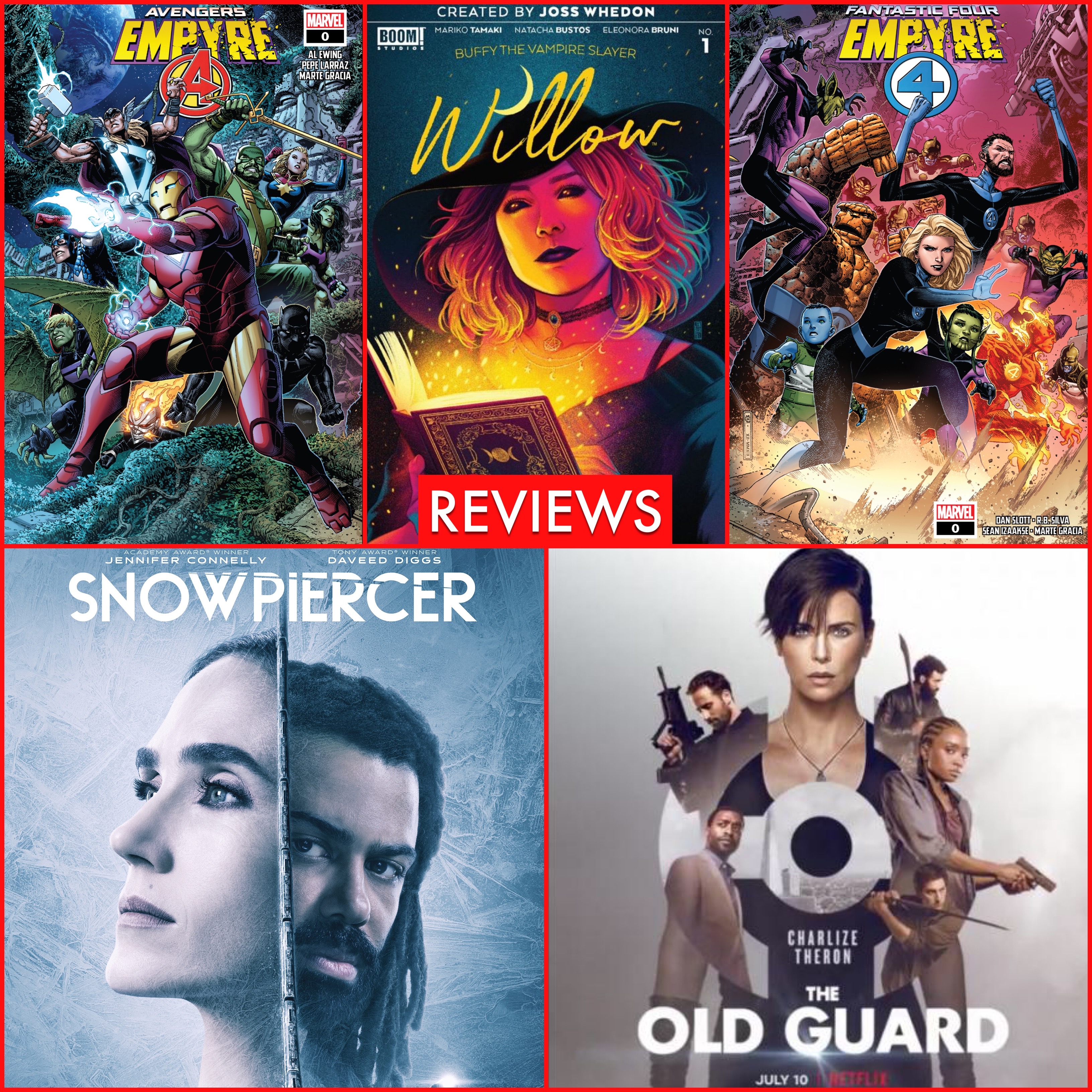|

|
JOE QUESADA Joseph "Joe" Quesada (born December 1, 1962), colloquially known as Joe Q, is the editor-in-chief of Marvel Comics and a comic book writer and artist.
Quesada was born in New York City. He studied at the School of Visual Arts, where he received a BFA in illustration in 1984. He started out as an artist in the early 1990s. His first widely distributed works were for Valiant Comics where he penciled and plotted Ninjak, X-O Manowar and others. His art was heavily influenced by Japanese manga, evidenced by large, watery eyes, long, flowing hair, and unnatural body proportions. Several of his page compositions reflect the art nouveau style of Alphonse Mucha. Later, he formed his own publishing company, Event Comics, and created Ash, a firefighter with superPowers.
In 1998, Event Comics was contracted to do several books for Marvel Comics, dubbed Marvel Knights. As editor of Marvel Knights, Quesada encouraged experimentation and used his contacts in the indie comics world to bring in new creators such as David W. Mack, Mike Oeming, Brian Michael Bendis, Garth Ennis, and Steve Dillon. Quesada also illustrated a well-received Daredevil story written by cult film director Kevin Smith. Joe Quesada became editor-in-chief of Marvel Comics in 2000. He also sits on the executive board of comic book charity A Commitment to Our Roots.
Editor-in-chief of Marvel Comics
Joe Quesada is best-known as the editor-in-chief of Marvel Comics. He succeeded to this position in 2000, following Bob Harras's separation from the company. Joe Quesada is the first Hispanic editor-in-chief of Marvel Comics and one of the few Hispanics in the industry to have achieved prominence for work other than his own draftsmanship. As editor-in-chief of one of the two largest publishers in the comic book business, his decisions are influential and have had, and continue to have, reverberations outside the world of comics. He has been the subject of much praise and derision from commentators both inside and outside the industry, due to his headstrong management style and far-reaching effects on Marvel books and the industry at large.
Quesada became editor-in-chief at the same time that controversial personality Bill Jemas succeeded to the presidency of the company. The two enjoyed enormous success together and enjoyed a seemingly warm personal relationship. The fruits of that relationship culminated in the establishment of the Ultimate line of Marvel titles, which were aimed at teenagers, took place outside of the restrictive continuity of the Marvel Universe, and heralded Marvel's--and the industry's--climb back to prominence. Jemas, after a series of discussions and changes in his role as a Marvel executive, separated from the company.
Quesada, however, was retained as editor-in-chief; Jemas's separation had the unexpected result of confirming the company's, and subsequently the industry's, confidence in Quesada's stewardship. During his partnership with Jemas, and more so afterwards, Quesada became an industry mover and shaker.
Joe Quesada is credited with supervising Marvel Comics during a revival and a period of growth in which Marvel Comics recovered from the bankruptcy of the late 1990s. Throughout the 1990s, Marvel Comics relied chiefly on its large stable of popular characters and considered its creators to be replaceable, hired laborers. With Avi Arad heading up Marvel's licensing division, Quesada was free to focus on hiring capable talent and matching them with compatible titles, characters, and other creators. Examples of this among writers include J. Michael Straczynski on Amazing Spider-Man, Mark Waid on Fantastic Four, and Brian Michael Bendis on Ultimate Spider-Man, Daredevil, and Avengers. Quesada considered comic-making to be Marvel's core function and focused on the quality of Marvel's key titles, not allowing Marvel simply to rest on the laurels of decades-old comic creations. His tenure has seen many worn-out titles rise once again to prominence in the sales charts, due to creative team changes, changes in creative and editorial direction, and relaunches, the most successful as of August 2006 being New Avengers.
Joe Quesada dislikes comic book deaths and, early in his editorial career, imposed a moratorium on the comic-book practice of creatively bringing back a character thought to be dead. He also banned the use of editorial footnotes in comic books early in his tenure, though like the case with comic book deaths, this ban has since become relaxed.
Joe Quesada has also banned Marvel characters from smoking, including Wolverine, the Thing, J. Jonah Jameson and Nick Fury. This stems from his own father's death from lung cancer and his feeling that these characters, whom kids look up to, should not be seen smoking. Although this has been common practice in recent television shows, films or commercials, the decision attracted criticism because the characters are seen as ICONs and Marvel is largely not child-friendly in its most well-known comics.
Joe Quesada's predecessor as Marvel editor in chief, Bob Harras, cancelled and restarted all of Marvel's titles that were not either X-Men-related or at fewer than 100 issues already. This was an effort to shore up sagging sales with a new #1 issue for each of Marvel's popular titles, issued at a time shortly after the bust of the comic book collecting industry, and when Marvel was in the throes of bankruptcy. Quesada reversed this policy first by showing the "old," combined issue numbers beside the "new" numbers on covers (the difference between the two issue numbers shown on the cover would always be the number of issues that the series had before Harras restarted it), and then definitively restoring the "old" numbers for Fantastic Four, Amazing Spider-Man, and Avengers when they each passed the 500 mark. (For Avengers, this was short-lived; at writer Brian Michael Bendis's request, the book was restarted as New Avengers.)
Joe Quesada has been involved in the creation of three successful imprints:
Marvel Knights, aimed at older readers (before his tenure as editor-in-chief)
MAX, aimed at adult readers, with Brian Michael Bendis
Ultimate, aimed at teen readers, with Brian Michael Bendis and Mark Millar
Quesada has advocated he is personally not a fan of comic book creators signing exclusive contracts with Marvel or DC Comics instead of freelancing, yet he understands that it is simply how the market works in this day and age.
Under Joe Quesada's guidance, Marvel Comics became an aggressive publisher of trade paperbacks, moving them from a quiet aftermarket to a primary means of content delivery. Before Quesada's time, comic book collections were spotty, releasing only tried-and-true stories from ages past and presented in such a manner to hide that they were ever monthly comics, with each issue bereft of its individual title or issue number. Joe Quesada changed that policy, aggressively marketing trade paperbacks as an alternative to the monthly series they reprinted, getting comic book collections into mainstream bookstores as well as specialty comics shops. Gone were the days of reprint collections sheepishly introduced long after their source material; under Quesada, Marvel began producing trade paperback collections intime with monthly comics, often releasing weeks after the final collected issue. Trade paperbacks became as complete as the monthly issues, covering every issue of popular titles and released with volume numbers on the spine.
One good point of Quesada's trade paperback policy is that trade paperbacks are easier for casual readers to collect, both by appearing in mainstream bookstores and containing many issues in one, numbered volume. Another advantage is that they are reprinted continuously, making them easy to find on store shelves (unlike monthly comics, where important story points can drive up an individual issue's value and, thus, its rarity, see comic book collecting). Problems with trade paperbacks include the concern that they cannibalize monthly comic book sales, that writers may be forced to extend a serialized story until it is long enough to fill a trade paperback, and that, by being in mainstream bookstores, they hurt the specialty comic shops that are Marvel's financial bread and butter. However, Quesada's policy of complete and well-presented trade paperbacks was one of the central pillars that brought Marvel back from the brink of bankruptcy following the disastrous years of the late 1990s.
Bibliography
Joe Quesada's art has been featured in:
The Ray
Batman: Sword of Azrael
X-Factor
X-O Manowar
Ninjak
Ash
Daredevil v2
Daredevil: Father
He was the co-creator of Azrael with Denny O'Neil.
Joe Quesada's writing has been featured in:
Daredevil: Father
Iron Man v3
NYX
This article uses material from Wikipedia and is licensed under the GNU Free Documentation License.All material is compiled from numerous sources and may not be accurate. Dynamic Forces, Inc and all of its subsidiaries cannot guarantee the validity of the content. |
 |



